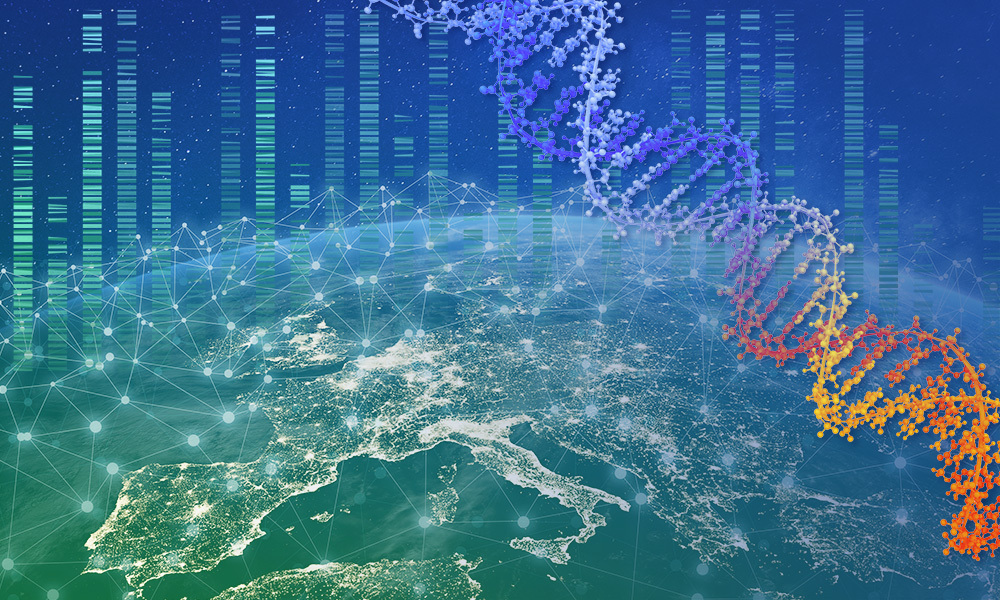Standards recommendations for the Earth BioGenome Project
PNAS 25 January 2022
10.1073/pnas.2115639118
On track to reach an ambitious goal of 3,000 genomes sequenced by the end of 2022, what’s next for the Earth Biogenome Project?

A global effort by researchers across the globe, including those at EMBL’s European Bioinformatics Institute (EMBL-EBI), to map the genomes of all plants, animals, fungi and other eukaryotic life on Earth, is entering a new phase as it moves from pilot projects to full-scale production sequencing. This new phase of the Earth BioGenome Project (EBP) is marked with a collection of papers published this week in the journal Proceedings of the National Academy of Sciences (PNAS), describing the project’s goals, achievements to date, and next steps.
“The special feature on the EBP captures the essence and excitement of the largest-scale coordinated effort in the history of biology,” said Harris Lewin, chair of the EBP Working Group and Distinguished Professor of Evolution and Ecology at the University of California, Davis. “From fundamental science to breakthrough applications across a wide range of pressing global problems, such as preventing biodiversity loss and adapting food crops to climate change, the EBP’s progress in sequencing eukaryotic life is humbling and inspiring. Achieving the ultimate goal of sequencing all eukaryotic life now seems within our reach.”
Launched in November 2018, the goal of the EBP is to provide a complete DNA sequence catalogue of all 1.8 million known species of plants, animals, and fungi, as well as single-celled eukaryotes.
Earth is forecast to lose 50% of its biodiversity by the end of this century without action to curb climate change and protect the health of global ecosystems. Creating a digital library of DNA sequences for all known eukaryotic life can help generate effective tools for preventing biodiversity loss and pathogen spread, monitoring and protecting ecosystems, and enhancing ecosystem services.
The project functions as an international network of networks, acting as an overarching hub to coordinate numerous group-specific, regional, and national-scale efforts, such as the California Conservation Genome Project, Darwin Tree of Life (DToL) Project, the Vertebrate Genomes Project, and the Bird 10,000 Genomes Project.
“Many of these large-scale sequencing projects have seen setbacks during the COVID-19 pandemic,” said Peter Harrison, Genome Analysis Team Leader at EMBL-EBI. “It’s fantastic to see the EBP making progress to reach its goal of sequencing all of Earth’s eukaryotic biodiversity. We’ve made huge strides this year within the DToL project and we’re excited to see what the next few years will bring for the project.”
By the end of 2023, the EBP aims to produce reference genomes representing about 9,400 species. So far, affiliated projects have produced around 200 reference genomes, with sequencing, assembly, and annotation of more than 3,000 expected to be completed by the end of 2022 – meaning that the project is on track to reach its target.
“The EBP is just a fantastic project to be a part of,” said Paul Flicek, Associate Director of EMBL-EBI Services. “The project has set some ambitious goals but it’s great to see that we’re on track and researchers everywhere will soon have access to the huge amount of genomic data generated from the project. This is going to be a massive step towards better understanding global biodiversity and ecosystems and helping prevent global biodiversity loss.”
As of December 2021, the project includes 5,000 scientists and technical staff at 44 member institutions. The latest projects to join include the African BioGenome Project (AfricaBP) – a group of Africa-affiliated institutions in more than 22 countries, BIOSCAN, and the Global Virome Project – an effort to discover new viruses that might pose pandemic threats.
“The African BioGenome Project presents not only an opportunity to conserve Africa’s rich biodiversity through genomics but also a unique opportunity for the African people to build genomics and bioinformatics capacities and infrastructures for long-term conservation efforts,” said ThankGod Ebenezer, Bioinformatician at EMBL-EBI and founder of the African BioGenome Project. “Africa has some of the greatest biodiversity on the planet, a good proportion of which are endemic and endangered. We can use the genomic data collected from the project for the conservation of African biodiversity and improvement of agriculture across the continent.”
Major activities of the first three years for the EBP have included developing and evaluating standards and strategies, organising regional, national, and transnational projects, and building the global communities involved.
The EBP also formed the Ethics, Legal and Social Issues Committee and the Justice, Equity, Diversity, and Inclusion Committee. The EBP’s proactive stance on understanding ethical, legal, and social issues surrounding the project will inform recommendations on access and benefit sharing, as well as equity and inclusion in the biodiversity genomics community and in indigenous communities within the world’s most biodiverse countries.
This story was originally published on the UC Davis website.
PNAS 25 January 2022
10.1073/pnas.2115639118
PNAS 25 January 2022
10.1073/pnas.2115635118